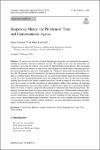Item Infomation
Full metadata record
| DC Field | Value | Language |
|---|---|---|
| dc.contributor.author | Jonas, Ivarsson | - |
| dc.contributor.author | Oskar, Lindwall | - |
| dc.date.accessioned | 2023-04-07T07:22:50Z | - |
| dc.date.available | 2023-04-07T07:22:50Z | - |
| dc.date.issued | 2023 | - |
| dc.identifier.other | https://link.springer.com/article/10.1007/s10606-023-09465-8 | - |
| dc.identifier.uri | https://dlib.phenikaa-uni.edu.vn/handle/PNK/7669 | - |
| dc.identifier.uri | https://link.springer.com/article/10.1007/s10606-023-09465-8 | - |
| dc.description | CC BY | vi |
| dc.description.abstract | In recent years, the field of natural language processing has seen substantial developments, resulting in powerful voice-based interactive services. The quality of the voice and interactivity are sometimes so good that the artificial can no longer be differentiated from real persons. Thus, discerning whether an interactional partner is a human or an artificial agent is no longer merely a theoretical question but a practical problem society faces. Consequently, the ‘Turing test’ has moved from the laboratory into the wild. | vi |
| dc.language.iso | en | vi |
| dc.publisher | Springer | vi |
| dc.subject | natural language processing | vi |
| dc.subject | practical problem society faces | vi |
| dc.title | Suspicious Minds: the Problem of Trust and Conversational Agents | vi |
| dc.type | Book | vi |
| Appears in Collections | ||
| OER - Công nghệ thông tin | ||
Files in This Item:

